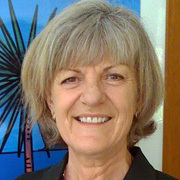
Diane Musgrave
Diane Musgrave grew up in Sydney, and trained as a teacher. Moving to New Zealand with her husband, she taught briefly in Wellington before beginning her screen career at TV One News, working in the library at Avalon and filing news reports. A six-week TV One course in production and direction in 1976 was followed by stints as studio director for religious programme Open Mind and as field director for With One Voice.
Musgrave’s “real interest” was in current affairs, which led to research roles on shows like Seven Days and Dateline Monday (Musgrave is credited during this period as Diane Fowler, her married name; she reverted to her maiden name in 1984.) She also took on research and direction for consumer programmes (Fair Go), children's shows (Gizago, Kidsworld), and magazine shows (Kaleidoscope, Weekend).
A shift north to Auckland had opened up “a world of opportunity”, as Musgrave freelanced for TV One and overseas shows and corporates.“Programmes like Fair Go were based in Wellington, so I was able to check out the Auckland stories to see if they held up.” Musgrave was studio director for Prime-Time and researcher for entertainment show Two on One, where she meet visiting celebrities like Dynasty actress Joan Collins.
Musgrave joined up with Colleen Hodge, Liz Greenslade and Julienne Stretton in the early 80s to form Bluestockings, a research, production and promotion company (from 1989, Bluestockings would become Musgrave alone). For the Feltex Award-winning 1984 documentary Gallipoli: The New Zealand Story, the Bluestockings team interviewed veterans of World War I. “I remember it was one of the most challenging research assignments because the vets were ageing and in many cases talking to me was the first time they had really outlined their horrific experiences in detail. One vet had me in tears. He died the following week and was never put on film.”
Among dozens of research credits Musgrave’s name can be found on many notable productions including the legally-complex Erebus - the Aftermath and Kenneth Cumberland's Landmarks series. She was script advisor on political docudrama Fallout and 80s drama series Seekers.
In 1992 she helped expose a miscarriage of justice in award-winning docudrama The Remand of Ivan Curry, working as researcher with investigative filmmaker Keith Hunter to reveal the fallibility of the NZ court system. Curry was a profoundly deaf 21-year-old, arrested and charged for the murder of his 15-month-old nephew in 1988. After being held without bail for two years, it took a jury two hours to fund Curry not guilty. Curry played himself in the dramatised sequences.
Through the 90s Musgrave was a producer and director on some of the decade’s most high profile TV current affairs stories, on Frontline, Assignment and 60 Minutes. In 1995 she directed reporter Terence Taylor in an hour-long Assignment exploration of the changing face of Māori leadership, as the mandate of traditional tribal authority was challenged by young and urban Māori. ‘The Power of Chiefs’ aired in the lead up to the Tainui Treaty of Waitangi claim.
The same year she produced and directed an Assignment report — 'Ellis Through the Looking Glass' — into the controversial Peter Ellis case. The Christchurch creche worker had been convicted of child abuse and the story cast doubt on the verdict, querying how the children's testimony was obtained and presented to the jury. Cornell University psychologist Stephen J Ceci was interviewed by reporter Rod Vaughan for the story, and later recommended as a consultant by the official judicial review. 'Looking Glass' won a Bravo Award from the NZ Skeptics Society, and Assignment won Best News and Current Affairs Programme at the 1996 TV Awards.
In 1998 Musgrave produced short documentaries for the new subscriber-funded Sundance Channel (now Rialto Channel).
The following year she produced a 60 Minutes investigation into the death of four-year-old James Whakaruru. His mother's partner had been convicted of manslaughter. The report — ‘Death by Silence’ — argued that the death was preventable. When Musgrave asked the perpetrator's father if he’d ignored warning signs, he replied “no, I didn’t ask … you might as well blame me for whatever happened to James.”
Musgrave reflected in 2016: “I came to realise the privileged position I was in. In some cases I was recording history: for the 1995 Waitangi Day protests we shot the footage of the stamping on the flag and the spitting at the Governor-General; in Tahiti we were in the thick of the violent anti-nuclear protests, and faced the armed police who wanted to arrest us as well as the protesters”. In 1995 Musgrave was the only foreign producer to interview Robert Mugabe during the Commonwealth Heads of Government meeting held in Auckland.
Although her stories were often in the headlines, Musgrave was humbled by the experience “of meeting ordinary people who were willing to share their stories with the nation.”
“I believe as we make productions we must always operate with integrity and fairness. We must be true to ourselves, fair to the people who consent to participate and honest with our audiences.”
Musgrave was a board member of the Broadcasting Standards Authority from 2003 – 2009, and has served as a judge for multiple Qantas Media Awards and Qantas TV and Film Awards. She is currently Senior Lecturer in AUT's Communication Studies department, where her research interests include media ethics and women in the media.
Sources include
Diane Musgrave
'Diane Musgrave' Auckland University of Technology website (Broken link). Accessed 10 May 2016